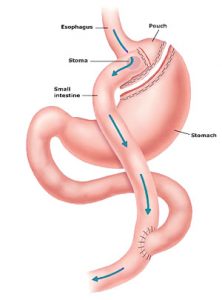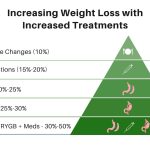
Diagram of Gastric Bypass
Types of Gastric Surgeries
- Vertical Sleeve Gastrectomy (VSG or Sleeve)
The Vertical Sleeve Gastrectomy (VSG or Sleeve) is the most commonly performed weight loss surgery in the United States.
- Gastric Bypass (Roux-en-YGastric Bypass)
The second most commonly performed weight loss surgery is the Gastric Bypass (Roux-en-Y Gastric Bypass).
- Sleeve Gastrectomy
The Sleeve Gastrectomy is more popular because it has a lower serious complication rate (1%) compared to the Gastric Bypass serious complication rate (2%). It also does not change the anatomy of your gastrointestinal tract as dramatically and results in fewer changes to your eating habits.
Which surgery is right for me?
How long does it take to see results from gastric bypass?
Weight loss after either the Gastric Sleeve or the Gastric Bypass takes around one year before you reach your minimum weight, however, half of the weight loss occurs within the first 3-4 months. Many patients will lose 10% of their total body weight within the first month after surgery. The Gastric Bypass is a slightly more effective weight loss surgery (usually resulting in 20-30 pounds more of weight loss compared to the Sleeve Gastrectomy).
What is the recovery time for gastric bypass?
Both the Gastric Sleeve and Gastric Bypass have similar recovery times. Most patients are starting to feel like themselves again after one week. It is not uncommon for patients to return to work part time after one week and full time after two weeks. The recovery time for a Sleeve Gastrectomy is slightly shorter than for the Gastric Bypass, but only by a matter of a few days.
Returning to a normal eating plan takes much longer for both procedures and there is almost no difference in the time between the two procedures. It typically takes around 4-6 weeks before you can eat solid foods comfortably and you will be limited to eating only a few bites of food at a time for the first three months. However, during these first three months, you have almost no hunger at all, so the fact that you can only eat a few bites of food isn’t bothersome.
Fatigue is another common problem experienced by around 20% of all postoperative patients during the first 2 months after surgery. However, after the fatigue resolves, most patients report much higher energy levels than before surgery.
Here are some real gastric sleeve & bypass patients before and after
What are the possible adverse effects of bariatric surgery?
The adverse effects after surgery vary between the two surgical procedures. Short term complications like bleeding, blood clots or infection are extremely rare and Dr. Weiner has less than a 1% serious complication rate after both Gastric Bypass and Sleeve Gastrectomy surgeries.
After a Sleeve Gastrectomy, the most common side effect is heartburn. For most patients, the heartburn can be managed with medication, but for around 5%, the heartburn is so severe that they need to have their Sleeve Gastrectomy converted to a gastric bypass. Even though having a second surgery is very stressful, this conversion procedure results in resolution of the heartburn almost 100% of the time.
The other adverse effect after a Sleeve Gastrectomy is weight regain. Long term success after a Sleeve Gastrectomy requires a really great diet and exercise plan. . Even with good compliance with your postoperative recommendations, some Sleeve patients will gain weight, however the new class of weight loss medications (GLP-1 agonists), or a SADI procedure can be very helpful in treating or preventing weight regain after Sleeve Gastrectomy.
Gastric Bypass patients have more gastrointestinal side effects after surgery like dumping syndrome if they eat fatty or greasy foods. They also can develop ulcers (around 1% of the time), much more common if you regularly use NSAID medications, smoke or drink alcohol. There is also a 4% risk of alcoholism after Gastric Bypass surgery, so those who drink alcohol regularly should be very careful with their decision to have Gastric Bypass surgery. Dr. Weiner recommends that anyone who has Gastric Bypass surgery should understand that it may be necessary for them to completely quit drinking after surgery if they find alcohol more desirable.
Finally, Gastric Bypass patients have a 3% risk of developing a bowel obstruction after surgery. While this sounds like a terrifying complication, the overwhelming majority (98%) of patients only require 1-2 days in the hospital after surgical treatment of the obstruction if the procedure is performed by a Bariatric Surgeon. Most patients are able to return to work one week after surgery to treat a postoperative small bowel obstruction.
Gastric Bypass patients are much less likely to regain weight after surgery, compared to Sleeve Gastrectomy patients. Around 80% of Gastric Bypass patients are able to maintain their weight loss for ten or more years after surgery. Like Sleeve Gastrectomy, the new GLP-1 medications can be helpful if you experience weight regain after a Gastric Bypass.
Care after a Sleeve Gastrectomy
Care after a Sleeve Gastrectomy or Gastric Bypass procedure requires a significant change in your eating and exercise habits (if you are capable of exercising safely). Our postoperative nutrition program is available for anyone interested in nutritional and emotional support after Bariatric Surgery (even patients who are not patients of Dr. Weiner).
The Pound of Cure program is committed to your lifelong weight loss success and will support you through your entire weight loss journey, not just through your surgery. Our non-surgical program is designed for surgical and non-surgical patients alike to ensure your long term success.
Is it worth it?
After performing 3,000 weight loss surgeries, Dr. Weiner understands that weight loss surgery is not for everyone. Our program is focused on maximizing weight loss using all four methods that result in long-term, durable weight loss:
- Nutritional Change – Using the Pound of Cure approach to eating,Dr. Weiner and his team will help you change the type of food you eat to maximize your postoperative (or non-operative) success
- Exercise to build muscle – Most people overestimate the amount of weight that they can lose through exercise. Exercise is a very powerful weight loss tool for younger people because they are capable of building muscle. However, as you age, it becomes more and more difficult to build muscle. Durable weight loss from exercise comes from building muscle that helps you to maintain a lower weight
- Medications – the new GLP-1 medications are game-changers in the weight loss medication world. We start many of our preoperative patients on these medications if they’re able to get insurance coverage. These medications are amazing adjuncts to, and in some cases, replacement of Bariatric Surgery
- Bariatric Surgery – Weight Loss Surgery causes a permanent change in your anatomy that will change your relationship with food. By changing the way food flows through your GI tract, your intestinal hormones change, resulting in your brain thinking that you should lose weight. These anatomic changes block the increased hunger and decreased metabolism response to dieting that have prevented you from losing weight and maintaining it in the past.
Want more information how gastric sleeve surgery might help you?
Get started below
Have questions? Not sure? Talk to our friendly team at (520) 298-3300






Is the having the gastric sleeve successful if you have lost weight on the glp1 meds or does it prevent weight loss because you have lost weight with these drugs successfully and just haven’t reached the results you want ? . Will the pound of cure work for further weight loss or prevent weight regain without the glp1 meds with and without the gastric sleeve. I do not want to take the meds long term they are expensive and not a lifestyle I wish to maintain I want my food – I switched to plant based several months ago – to be my medicine.
The meds are intended to be taken long term, expecting to maintain the weight loss after stopping them is setting yourself up for disappointment. The remaining questions all vary based on many factors.